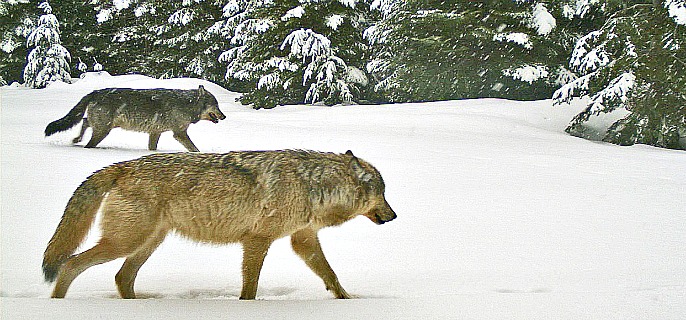
PHOTO COURTESY OF ODFW
Oregon’s known wolf population continued to grow in 2015. The minimum Oregon wolf population is now 110 wolves, a 36-percent increase over the 2014 population.
ODFW released the 2015 Wolf Report today, after completing late-winter surveys to establish how many wolf packs had bred and the minimum known number of wolves for the year 2015. The department uses hard evidence (tracks, sign, remote camera footage, visual observations) when counting wolves and that is why the population figures are referred to as a minimum known population. Wildlife biologists believe the actual number of wolves is likely higher.
ODFW documented 11 breeding pairs of wolves in 2015, up from nine last year. A breeding pair is an adult male and female wolf that produce at least two pups which survive through the end of the year. (Pups are born in mid-April each year.) Reproduction was confirmed in 14 groups of wolves, and 33 pups born in 2015 are known to have survived through Dec. 31. ODFW also documented three new pairs of wolves. Known wolf groups occurred in parts of Baker, Grant, Jackson, Klamath, Lake, Morrow, Umatilla, Union and Wallowa counties.
“As predicted, Oregon’s wolf population has continued to expand its range and grow in number,” said Russ Morgan, ODFW wolf coordinator. “While northeast Oregon continues to have the highest number of wolves, there is also continued movement of wolves into southern Oregon.”
The rate of depredation of livestock by wolves decreased in 2015 despite the increase in wolf population. ODFW investigations confirmed nine incidents of wolves killing livestock and two probable incidents. A total of 10 sheep, three calves and one working dog were killed by wolves, and another two calves and one lamb were injured. This is down from 11 confirmed incidents and 32 livestock (2 cattle and 30 sheep) lost last year.
A total of 29 percent of Oregon wolf packs were involved in livestock depredation. The majority of depredations (77%) occurred on private land and most happened during the months of May, June, August, September. The Oregon Department of Agriculture’s Wolf Depredation Compensation and Financial Assistance program distributed $174,428 in grants to 10 counties to proactively address wolf-livestock conflict and compensate landowners who lost animals to wolves. Most funds were used for preventative measures ($119,390) and for direct payment ($14,018) to livestock producers for confirmed losses.
While no wolves were killed by ODFW, agents or landowners due to livestock depredation, ODFW documented seven wolf mortalities in 2015. A five-month-old pup was found dead in the Catherine Pack rendezvous area and appeared to die of natural causes. One wolf that died had a rodent in its stomach and the wolf tested positive for a chemical that is poisonous to animals. The cause of the death of the Sled Springs breeding male and female found dead in August is unknown. Three wolves were illegally shot.
A Baker City man pled guilty to shooting one of the wolves and was fined $2,000 and ordered to forfeit his rifle to the state. The other cases involving illegal activity are still open and anyone with information should call Oregon State Police.
ODFW continued its efforts to monitor Oregon’s wolf population by collaring an additional eight wolves over the year. At the end of 2015 there were collars on 11 percent of Oregon’s wolf population.
To see the full report or learn more about wolves, visit the ODFW website.










